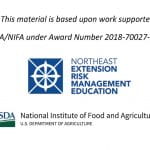Four Questions to Ask about your Relationship with your Farm Accountant
By Katelyn Walley-Stoll, Farm Business Management Specialist, Cornell Cooperative Extension’s Southwest New York Dairy, Livestock, and Field Crops Program for CCE Farmer Tax School
Farm accountants are critical to any farm business. They do so much more than file your taxes. They can analyze your business, prepare financial statements and help you with compliance issues. They also serve as another point of view when it comes to making changes on the farm.
Finding an accountant that you have a positive relationship with can make all of the difference for your farm business management strategy. Your farm accountant’s perspective and guidance can help you to better monitor and manage your farm’s finances.
Because of the important role your accountant can play in your business, here are four questions you should ask yourself to better understand how your current accounting situation is going:
How many times a year do you see them?
Now, if your answer is once a year, that’s okay. That’s good, even – it means you’re likely in compliance with your federal and state income tax filings. However, if you want to utilize your accountant’s expertise even more, aim for semi- annual or quarterly meetings. These meetings are a chance to update balance sheets, ask questions, and do some preliminary income tax planning.
How many questions do you ask them?
You shouldn’t feel bad about asking questions throughout your conversations with your accountant. A good accountant should be open to your questions, have knowledgeable answers, listens to your concerns, and takes the time to help you understand your farm’s finances. These questions can range from “should I depreciate that” to “what information do you need to file a 1099” and “where do you think my business could improve profitability”. Another question to ask is “what services do you offer”. Being clear up front with your farm financial goals, and their expertise and ability to offer consulting services, is important to set realistic and clear expectations up front.
Do they work with a lot of farms?
Farm accounting is weird. In the accounting world, the switch from cash-based accounting (accounting for accounts as cash comes in and goes out) to the accrual method of accounting (adding in accounts receivable and payable) provides an added challenge for your accountant. Then, you have to consider the implications of raised livestock, government payments, conservation projects, and other tax considerations that apply only to farms. Choosing an accountant that is familiar with the Schedule F and the agricultural industry can make all of the difference.
Would you see them at your local coffee shop/diner/community picnic?
Okay, this one might be a little bit on the “fuzzy feelings” side, but hear me out. Farming is a lifestyle, a community, and a business. Working with an accountant that you feel comfortable with is important, and developing that relationship requires building a foundation of trust. I’ve found that the people I trust the most are those that are in my circle – the people who ask about my kids at the annual Farm Bureau picnic; pull up behind me at the Tim Horton’s drive through and honk; invite me to lunch after a morning meeting. Choosing someone that you feel comfortable with can help you to get the most out of your accounting relationship. Now, depending on your comfort level with social interactions, you might not want to see your accountant out and about. Rest assured – reputable accountants uphold confidentiality and will look at you and your business as separate entities.
Finding a good farm account is an important part of managing your farm as a business. Not sure your current accountant is the best fit? Ask around! Talk with your farm neighbors and agriservice providers to meet with several accountants. Set up mini-interviews, shake some (socially distanced) hands, and ask about their experiences working with farms.
This material is based upon work supported by USDA/NIFA under Award Number 2018-70027-28588.

